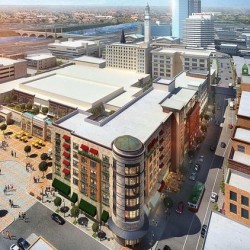
The $900 million MGM Springfield would be much larger than the East Windsor casino, but the idea is to keep Hartford gamblers in the state.
A federal appeals courts denied a request by MGM Resorts International for a re-hearing of its lawsuit versus the State of Connecticut. MGM Resorts’s suit was filed to stop a third Connecticut casino from being built in East Windsor, a suburb of Hartford.
After filing the case in 2015, U.S. District Judge Alvin W. Thompson ruled against MGM Resorts International in 2016. Since that time, MGM Resorts have appealed the case, but without any immediate success.
MGM Resorts lawyers argued that it is unconstitutional for the Connecticut legislature to give the Native American tribes which own Mohegan Sun and Foxwoods Casino to build a casino on non-tribal land. The Mohegan Tribe and Mashantucket Pequot Tribe have a deal in place to build the East Windsor casino, less than 25 minutes drive from the MGM Springfield.
MGM Resorts Argues Constitutional Law
The lawsuit contended that the State of Connecticut needed to hold a casino licensing process which would have opened the door to commercial casino operators. Previously, MGM Resorts had applied to build a casino in Southwestern Connecticut, most likely in Bridgeport.When the Connecticut legislature approved the East Windsor casino, MGM Resorts lawyers argued offering tribal gaming authorities a non-tribal casino deal violated the state and federal constitutions.
Uri Clinton, SVP and Legal Counsel for MGM Grand, said in a press release, “We believe this new law violates both the state and United States Constitutions, and we will continue to argue our case vigorously in court.”
Injunction Against East Windsor Casino
To gain an injunction against the building of the Hartford-area casino, MGM Resorts would have to re-file the lawsuit and begin the process anew. As the Mohegan and Mashantucket Pequot tribes await final approval from the U.S. Department of the Interior, that might still happen.
Many Connecticut lawmakers did not take the MGM Resorts plan for a Bridgeport casino serious. Attorney General George Jepsen even called it “a bluff”. Many Connecticut politicians, who have grown comfortable with the state-tribal gaming compacts, viewed MGM’s lawsuit as a stalling tactic.
MGM’s Pequot Fund Offer
As late as May 2017, though, MGM Resorts offered a plan to build an MGM casino and contribute to the Pequot Fund. Uri Clinton said his company would have made payments to the statement similar to those made by the Connecticut gaming tribes.
At the time, Uri Clinton said, “We knew this committee would not consider a competing offer if it didn’t cover the Pequot Fund. So the Pequot fund goes away, and you need an alternative that offsets that loss.”
MGM Casino Exclusion Zone
One reason two separate judges have ruled on behalf of Connecticut is a deal involving an “exclusion zone” for MGM Resorts. When it collected a casino license from the Massachusetts Gaming Commission for the Springfield area, MGM Resorts International agreed to a 50-mile exclusion zone.
Hartford and its various suburbs fall well within the MGM exclusion zone. Most of northeastern Connecticut falls under that zone. Connecticut’s lawyers argue that northeastern Connecticut is the only area in the state under serious consideration for a casino.
Hartford Area Satellite Casino
Thus, the Bridgeport casino idea is a non-starter. While MGM Resorts International rightly argues that such a casino would generate tremendous revenues, due to its proximity to New York City, that idea was never under serious consideration by the Connecticut State Legislature.
Instead, Foxwoods Casino and Mohegan Sun pitched a satellite casino plan for the Hartford area. The idea was to build a firewall between gamblers in northeastern Connecticut and the MGM Springfield Casino. The satellite casino would give local residents a fast and easy destination for gambling, thus keeping residents’ gambling dollars inside the state. The Connecticut legislature, the Mohegan Tribe, and the Mashantucket Pequot Tribe all agree that is the better plan.
